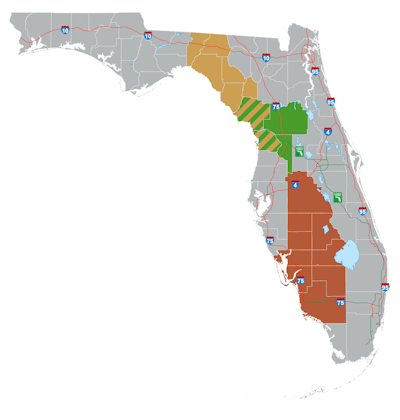
A controversial plan to build 330 miles of toll roads across Florida is dead – sort of.
Gov. Ron DeSantis signed legislation that repealed a bill he had signed into law in 2019 to move forward on planning and designs for three new toll roads:
- Southwest-Central Florida Connector – between Collier County and Interstate 4 near Orlando.
- Suncoast Connector – extending the Suncoast Parkway in the western part of the state from Citrus County to the Georgia line.
- Northern Turnpike Connector – extending the northern end of the Florida Turnpike at Interstate 75, northwest to the Suncoast Parkway.
Though the new legislation repeals the three projects, known as the Multi-Use Corridors of Regional Economic Significance, or M-CORES, two of them could still move forward on an alternate route, according to a group that opposes the toll roads.
The 150-mile Southwest-Central Florida Connector is officially terminated. It would have run through environmentally sensitive everglades where Florida panthers live and was criticized as a waste of taxpayers’ money.
The No Roads to Ruin coalition praised the repeal of the connector but vowed to fight the two remaining projects, which it says “are still on the books and must be stopped.”
The group says the repeal keeps the Northern Turnpike Connector plan but on a different timetable and replaces the Suncoast Connector with the extension of U.S. 19 from the Suncoast Parkway to I-10.
According to the Tampa Bay Times, the legislation calls for improving U.S. 19 “as necessary” from the Suncoast Parkway to I-10 by 2035 and extending the Florida Turnpike from I-75 to a “logical and appropriate terminus.”
The original legislation in 2019 formed three task forces, one for each of the projects, and called for construction to begin in 2022 and completed by the end of 2030. Supporters of the projects said they would aid hurricane evacuations, reduce congestion and boost the state and local economies. It would have marked the state’s largest road project since Florida Turnpike construction began over 50 years ago.









